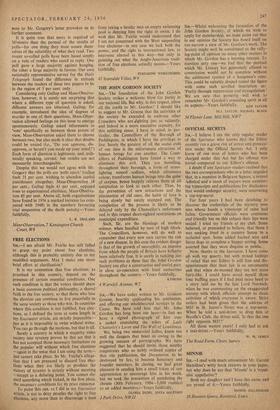FREE ELECTIONS
SIR,-1 am afraid Mr. Fairlie has still failed to grasp my point about free elections, although this is probably entirely due to my muddled arguments. May I make one more brief effort at clarification?
It is my contention that free elections, as practised in this country, depend on the presence of certain essential conditions. One such condition is that the voters should share a basic common political philosophy, a shared faith in the free society, so that those who lose the election can continue to live peacefully in the same society as those who win. In countries where this condition is not fulfilled, free elec- tions, as I defined the term at some length in my Encounter article, are strictly impossible— just as it is impossible to swim without water. You can go through the motions, but that is all.
Surely a country in which a majority votes society into tyranny proves by this act that it has not accepted those necessary limitations on the popular will without which free elections —again in the sense that I am using the term— just cannot take place. So Mr. Fairlie's allega- tion that I am prepared to discard free elec- tions when they arc likely to produce the victory of tyranny is strictly without meaning —except as a debating point. You cannot dis- card spmething which lacked, in the first place, the necessary conditions for ifs prior existence.
To point this out, as I did in my Encounter article, is not to deny peoples the right to free elections, any more than to discourage a man from taking a header into an empty swimming pool is denying him the right to swim. I do wish that Mr. Fairlie would understand that I am not concerned with the West suspending free elections—in any case we lack both the power, and the right in international law, to intervene abroad in this way—but only in pointing out what the Anglo-American tradi- tion of free elections actually means.—Yours faithfully,


































 Previous page
Previous page